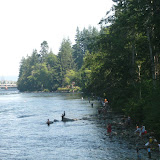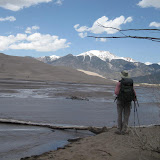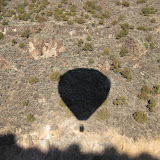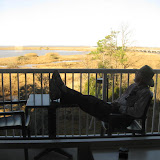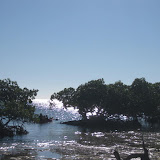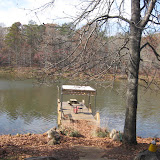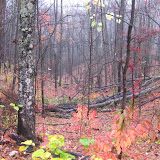Sunday, October 25, 2009
Travels in Nature and Focusing
In what follows, Ted anwers Nina Joy Lawrence, who asked us how we are focusing our way during our trip.
Hi Nina, Thanks for taking the time to "focus" on our new life together; Diane and Ted. I've tried to write a couple of things since we started our trip but am "all over the place." Your brief questions give me a more narrow perspective to address and I hope we will both find it useful.
First, I am impressed by how much of our self-image is dependent on a partner. I have spent seven years in psychoanalysis and a lot of time in solitude and I thought I knew myself pretty well. There is a certain dignity to the solitary crusader, Cervantes and Don Quixote or Man from La Mancha come to mind. Writers in general, I suppose, can give us a lot of valuable things to think about while themselves being miserable and lacking in self understanding. But for the endeavor of understanding oneself better, I am sold on an intimate relationship with a sensitive focusing partner for the best chance. We need to be very careful, of course, in the selection of said partner. Many would-be partners are hunting for some scapegoat to blame for all of their and the world's problems or have the expectation (conscious or otherwise) that someone else can fix all problems if they manipulate them carefully enough. This is the main benefit for me of our trip so far. I'm seeing some parts of myself with a new clarity and some of the views are quite painful and alarming. But I have a feeling that they are true and that carries with it a sense of profound relief; at least now I have a better idea about what the real issues are. Part of this is just not having music, reading,TV, movies or social activities to distract me from the bald-faced truth. It's sort of like sensory deprivation. But Diane is so perceptive and honest that when she registers her feelings I have to listen very closely.
My perception of couples in general is that they tend to become stagnant with one being the dominate member thereby supporting their fantasies of omnipotence/omniscience and the other becomes the scapegoat but derives importance from this role by being the martyr. We have tried (successfully I think) to avoid this and treat every decision as an opportunity for mutual input and a focusing session.
Returning to your message to us, my guess is that the people who go "glassy-eyed" when they are first exposed to focusing are unconsciously afraid. They have perhaps arrived at a place in life where their fears and anxieties are under control. They are in "quiet desperation" mode and want to protect the perhaps fragile self-image they have formed. You suggest to them a dangerous change and they "shut down." Some people in focusing promote it as a new and fun way to find more love and happiness. I got a nice round of applause, however, at a focusing meeting in New York City with Gendlin present when I suggested that focusers were heroes. I quoted Kurt Goldstein that the only true heroism given to us is the tolerance of ambiguity. That's the true test of courage; all the rest is fluff. Focusers must tolerate that awful ambiguity of being open to a body that sometimes knows more than "we" do (plus not making decisions for partners.)
I fear that this may be a blind spot in the focusing movement which could be a kind of Achilles Heel. If a focuser expects only love and happiness, that is likely what he or she will elicit in others or find in the self. The fears, hates and anxieties will likely remain hidden in the unconscious but still in control of most of the behavior. The temptation to promote focusing (just as in other guided self-improvement programs like "Philosophy Works") as a happy experience may be strongest in those attempting to generate an income from the experience. Clients or customers are seldom willing to pay for something that hurts. One could argue that we have to emphasize the positive aspect of focusing in order to gain acceptance in society and the painful truths will emerge over time in the future. Likewise, with the people who go "glassy-eyed" we may have to offer a modicum of support before they can muster the courage to try something new.
This leads into one of my own discoveries on our trip together of a load of anger and fear that I had not adequately explored. I have always had angry out-bursts of swearing when something minor goes wrong. I took it for granted; it was normal for me. Diane, being sensitive and open to my feelings expressed her concern about this behavior (the first person ever to do so). As I explored this behavior over time, talking to Di about it along the way, I was able to trace this back to a fear of the return of a childhood plagued with ear-aches; "many little things" went wrong then too (the unconscious doesn't recognize the passing of time the way our conscious mind does). There are other things wrapped up in this behavior such as narcissism and arrogance but I will limit myself to the one aspect here. And this is only one result of living together in an open and honest way. Feelings long repressed have an opportunity to stir.... to participate in the conscious processes of living. I'm saying this in a general way, but of course, I don't know if it has widespread applicability or is just a unique aspect of a unique couple in a unique situation.
I guess you could say we are a couple in process which I feel is a kind of progress. Probably we will never stop changing; running into unexpected feelings in self and other and then attempting to see how these affect us as a couple and how we can accommodate to the new experiences. We attempt to be open to the changing fabric of our relationship; we try not to freeze it or predict it; to help it unfold in its own unique and creative way. But it's hard; although we've known each other for two years, this is our first adventure in 24/7 living together for both of us in a long, long time. Our trailer is small and cramped and Di works in the morning of almost every work day. We start and end each day in Di's bed with a quasi-focusing pillow talk (we sleep in separate beds from force of long habit). We check in with each other on how the night or day went and what dreams we remember and feel like sharing. In more structured focusing I tend to find my body has no good answers on how to live in an intimate relationship; it`s never been there before. We are both exploring new territory and adding up joys and disappointments as we go along. Life definitely feels richer.
An important part of our life together is our almost daily exercise together in the wilder parts of nature. Nature, just by its disorderly and even chaotic quality tends to give the lie to our more civilized illusion of control over powers outside of us. In wild nature dead trees, limbs and brush lie about in disarray. But the death is combined with rebirth and new life springs Phoenix-like from the destruction. Even the death provides new nourishment to the soil for the benefit of future generations. And perhaps this is the most that any of us should expect; that the effects of our lives should in some way provide some guidance toward wisdom for future generations. It seems to me that this exercise in nature perhaps opens up some of our psychological as well as physical pores thereby letting in the great truth of nature that we are all insignificant and like the line from the song, My Old Kentucky Home, we will pass and be forgotten like the rest. This contrasts with the orderly lay-out of streets and buildings in the city with control of traffic flow which support the illusion of control over nature, including death. It helps, I think, if the exercise is strenuous. When we run into our physical limits, we know we are not omnipotent and if you hike long enough you will be lost and thus disabused of your fantasy of omniscience.
So we focus on being open and honest and sensitive to the other as much as possible and on compromise and trying different things to see what works best for us. We do not expect perfect solutions. But even as I think that, something deep inside me stirs and makes a muffled cry: "But yes, I do want perfection. I feel perfect and therefore deserve a perfect world." This is a part of all of us, I believe. The Spanish writer Unomuno typified that part when he refused to believe in any afterlife except one where his whole physical body would continue to exist. Ernest Becker, in all of his seven books but most eloquently in The Denial of Death, lays out this typical human dilemma. The best thing to do is to recognize it and "put it on a shelf for later attention." But I digress. So Diane and I try not to have too unrealistic expectations as we struggle together with our blunders and discoveries and try to accept that we don't know where we're going or how it's going to end. We hate the ambiguity and yet at the same time treasure it greatly for it is the only way we can achieve the most that we possibly can. We attempt to leave the future open in order not to close off any creative possibilities. Sharing our couple hood with others as we had originally planned will probably have to wait a bit but for sure the language barrier here is a problem for me.
I hope we will make it to Oregon and see you there, Nina Joy.
With undying great expectations,
Ted Cox
Subscribe to:
Comments (Atom)



